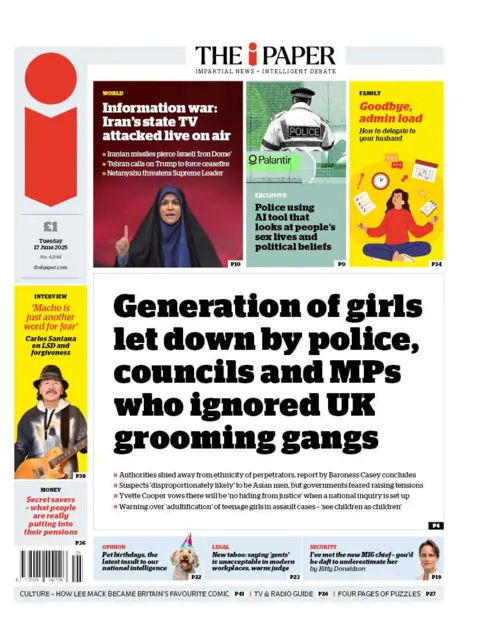In a recent report by Baroness Louise Casey regarding grooming gangs in the UK, the overarching sentiment expressed by various media outlets is one of alarm and anger. These sentiments converge around the notion that there has been a significant failure on the part of authorities, including police and local councils, to effectively address the systemic issues related to grooming gangs targeting young girls.
The report highlights the painful reality experienced by a generation of girls, who according to the i Newspaper, were “let down” by not only law enforcement but also the governmental bodies that failed to act decisively when such exploitation was rampant. It suggests that various public organizations avoided confronting the ethnicity of the perpetrators, fearing it might incite racial tensions within communities. This sensational finding has taken center stage, dominating headlines and public discourse.
The Daily Telegraph emphasized another facet of the report, mentioning that a significant number of ongoing police investigations involve asylum seekers and foreign nationals. This perspective, alongside the conclusions of the Casey report, has added layers to the narrative, complicating the public discourse surrounding immigration and crime.
The Metro stated that issues around “blindness, ignorance, prejudice, and defensiveness” have led to failures that victimized numerous individuals. Home Secretary Yvette Cooper has publicly apologized to the victims, addressing the long-standing complaints of negligence by the authorities. Such admissions signify a growing recognition of accountability among those in power and the systemic failures in safeguarding vulnerable populations.
On similar lines, the Daily Mail referenced a “conspiracy of silence over race” which allegedly contributed to the abuses of grooming gangs, implying that the reluctance of public bodies to candidly address the demographic makeup of offenders resulted in hiding the truth and, ultimately, perpetuating further abuses. These reports have evidently ignited heated discussions about responsibility, paving the way for calls for change and justice.
The emotional toll on the victims is evident in the coverage. For instance, the Daily Mirror’s headline “Never again” reflects a promise made by Cooper, stating that “there will be no hiding place from justice” for those responsible. This commitment to revisit over a thousand past cases indicates a readiness to confront previous shortcomings and hold offenders accountable.
Furthermore, the Sun’s depiction of the report as revealing how victims were “betrayed by the state” has fueled not only outrage but also a nationwide inquiry into institutional responses to such grave issues. The public’s appetite for reform denotes a crucial juncture for policymakers and law enforcement agencies in the UK.
As the media landscape has also reported, Israel’s ongoing military actions have also occupied significant airtime in conversations around governance and accountability. The Financial Times highlighted Israeli Prime Minister Benjamin Netanyahu’s claims of achieving “control” over Tehran’s airspace, with subsequent reports from the Guardian warning inhabitants of Iran to evacuate as Israeli strikes intensified.
The juxtaposition of these two significant societal debates—domestic grooming and international military conflict—seems to draw parallels around themes of power, control, betrayal, and justice, acting as critical points of reflection for societies worldwide.
As the UK grapples with the fallout of the grooming gang inquiries and the responses from authorities, it reveals deep-seated issues that challenge the notions of justice and societal protection. This combination of personal trauma, public outcry, and potential policy reform makes it a pivotal moment in the ongoing dialogue about collective accountability and justice for victims across different contexts, setting the stage for necessary changes rooted in transparency and proactive governance.



